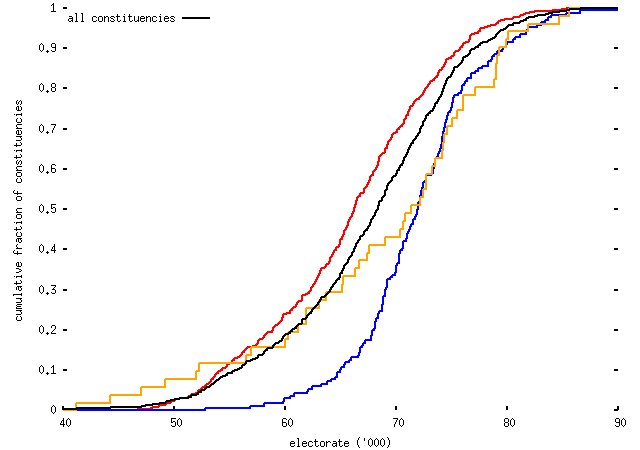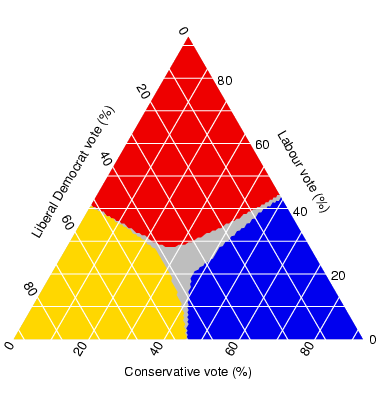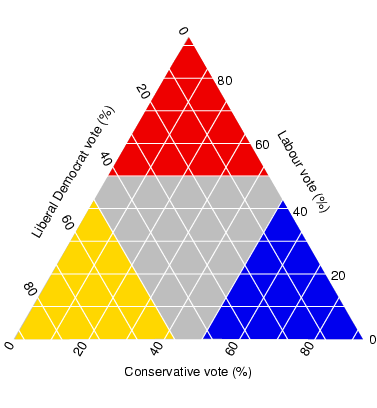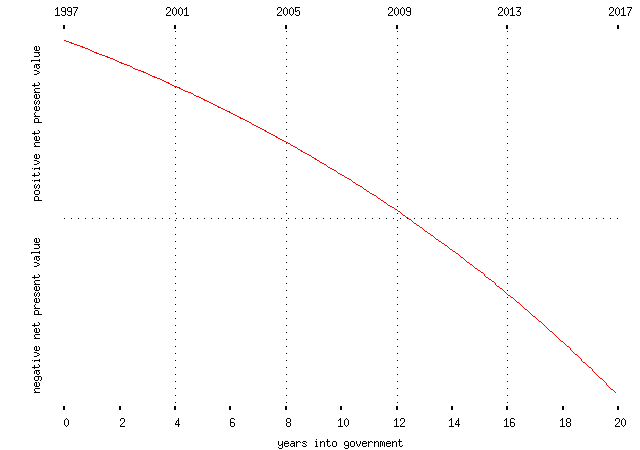So, it's election time, the traditional occasion for whinging about the British electoral system, such as it is. No doubt if I cared enough I could find all sorts of telling commentary on this from around the ``'blogosphere'', but rather than making you suffer that I'll quote something posted to NotApathetic:
I live in Nicholas Soames' constituency, Mid Sussex, and even if I could vote as often as a Birmingham Labour councillor it wouldn't move him an inch closer to being thrown out on his ear.
(This also has the pleasing side-effect that, rather than having to to spend a despairing hour Googling for cries of electoral pain from the rest of the UK ``'blogosphere'', I can just find something appropriate with a nice quick database query. On which subject -- I'd be most grateful if my half-dozen readers could help out with the soulless task of helping me cluster comments on NotApathetic -- I can promise you that it might be worth your while.)
Since this gives me another opportunity to expose you to my thoughts on bonkers electoral systems while re-using graphs I've already drawn, I thought I'd weigh in. (Plus, I got an email the other day from Paul Davies of Make Votes Count, asking me to contribute thoughts on this.)
As you will know -- unless you have been remaining in a state of happy ignorance for the past few centuries -- in the UK, MPs are elected on single-member constituencies under a first-past-the-post electoral system. Each elector may vote for up to one named candidate. In the last Parliament there were 659 MPs, and in the next one there will be 646 (following boundary changes in Scotland); the median constituency has about 68,000 electors. Labour constituencies tend to have proportionately fewer electors than Tory ones:
-- I understand (though I have not checked) that this effect is due mostly to quirks of demographics, of which the one most usually advanced is that Labour constituencies tend to be more urban and that, as technology changes, towndwellers are fleeing their lives of urban squalor, and exchanging them for lives of whinging about fox-hunting, driving SUVs down country lanes at break-neck speed, and the other trappings of rural squalor. Apparently the Boundary Commission can't keep up and the result is that the median Labour constituency gets by with only 66,000 electors while the median Tory constituency has about 72,000. This fact, no doubt, warms the hearts of the many Labour MPs who benefit from it.
(At this point I'll interpose a quick trivia question: what simple geographic feature do the constituencies having the largest and smallest numbers of electors share?)
Anyway, most of the alleged faults of our electoral system are summed up in this diagram, which I have posted before:
(A re-cap on how to read this: each point in the triangle represents a particular level of support for the three major parties, assuming a constant level of support for other parties. The colour of the triangle at that point shows which of the parties would achieve a majority in Parliament at that level of support, as predicted by a uniform national swing. The grey area shows conditions where no party is in overall control.)
For our purposes this diagram shows two important things: firstly, it is not symmetric under the exchange of any two parties -- the electoral system treats some of the major parties better than others; secondly, there are many points where a minority of support for a given party in the electorate will nonetheless yield a Parliamentary majority for that party.
Many people object to one or both of these features, and propose a variety of systems (usually referred to as `proportional') to replace our current tried-and-testing scheme. On the same type of diagram, such a system would look like this:
There are two general classes of objection to such systems:
- They break the link between constituent and MP.
- A system of proportional representation would put an end to Labour's Parliamentary majority.
One very sensible argument for the first of these (thanks to Martin Keegan for forcefully articulating this to me) is that an election should be viewed not as an aspirational exercise in the choosing of a future government but as a referendum on the conduct of the previous one. In order to achieve this electors ought to be in a position to sack their MPs. The charming notion here is that politicians will eventually learn by association that they ought not to annoy the electorate too much. Many proportional representation schemes (like the utterly wretched one used in the European elections) rely on a party list; when support for a party falls, the representatives who lose their jobs are those which the party has placed lowest on the list, not those whom the electors think have done the worst job.
Now... rather than discuss the merits of any of the variety of replacement electoral systems which have been proposed, I am going to propose one of my own:
For many advocates of the existing system, the election of single MPs in single constituencies is a requirement that any future system should maintain. My proposal is designed to achieve this, while also managing to be perfectly proportional. Instead of varying the electoral system in the country, I propose that to modify the conduct of divisions in the House of Commons.
Presently, each MP in the Commons gets one vote, and, when the house divides, the side with the largest number of votes wins. (When there is a tie, the Speaker casts a tie-breaking vote, traditionally for the Government.)
Observing that while electors do vote for individual candidates, they typically also care about the candidates' chosen parties, I propose that, rather than giving each MP one vote, we give them a (fractional) number of votes equal to the fraction of the electorate who voted for their party, divided by the number of MPs of that party elected, multiplied by the total number of MPs. As an example, here is how the 2001 election would look:
| Party | Support (%) | MPs | Each MP's vote |
|---|---|---|---|
| Labour | 40.7 | 413 | 0.65 |
| Conservative | 31.7 | 166 | 1.26 |
| Liberal Democrat | 18.3 | 52 | 2.32 |
| SNP | 1.8 | 5 | 2.37 |
| Plaid Cymru | 0.7 | 4 | 1.15 |
For the purposes of mental arithmetic, each Labour MP is worth roughly 2/3 of a seat, each Conservative MP 1 1/4, and each Lib Dem 2 2/3.
(As usual one should be a little cautious in interpreting historical election results translated into novel electoral systems since presumably the electorate's behaviour would change if the electoral system were modified. But the above seems plausible as a rough guide.)
There are various corner cases which one should treat. Independent MPs are easy to handle (treat as single-member parties -- for instance, Dr Richard Taylor would have had a voting weight of 0.71); harder are the cases of parties splitting or merging, or (as a special case) defection of an MP. Obviously one -- attractively simple -- possibility is for an MP to carry their voting weight with them for the duration of each Parliament, but that may not strike the right balance between support for an individual candidate and for their party. Similarly, a by-election can be treated as the election of an independent, or the new MP can be given the voting weight of the party they are joining. Anyway, these details don't affect the system fundamentally.
So, why are we not rushing to implement this system? Some possible objections, and their answers:
-
It embeds the notion of a political party into our electoral system
I agree that this is a Bad Thing, but (a) the damage is already done -- see European Elections passim; and (b) it is obviously true that many voters vote for parties not people, and, however much we despise this, we must accept it.
-
It complicates the telling of divisions in the House of Commons
True. However, MPs are paid almost £60k a year and (Government) whips get an extra £25k on top of that. For those sorts of prices, occasional resort to mental arithmetic ought not to be out of the question; and if the arithmetic becomes too taxing, MPs' expenses budgets (£118k, on average) can probably stretch to the cost of a pocket calculator.
(No but seriously: implementing this would probably require some sort of electronic voting, perhaps with a swipe-card or similar, to speed up the process. Since divisions in the Commons are not secret ballots, there is no trust problem with implementing such a system.)
-
I.e., different MPs should not have different amounts of power. Well, the whole point is that they should -- because of the vagaries of the system by which they are elected. It's more important, goes the argument, to have one elector: one vote than one MP: one vote.
-
One of the corner-cases you've glossed over above has horrid consequences which would make the scheme disastrous in practice
Actually, of course, as with all electoral-reform suggestions, the latter is the most important objection in practice. Such a scheme could only be implemented by a government with a majority in the House of Commons, and so -- since it would almost certainly result in that government losing its majority in the next election -- no rational government would implement it.
Consider a completely toy model. Suppose that you are in charge of one of two major political parties. Suppose that you derive benefit +b per unit time from being in power, benefit -b from the other major party being in power, and, on average, 0 from a hung Parliament where policy-making is by deals between the two major parties and other smaller parties. Suppose further that, owing to (waves hands) demographic change and stuff, power alternates between the two major parties, with each being in power for time T before being swept away to make space for a period of T under the other government. Finally, suppose that at any point during this cycle when you are in power, you can pull the plug on the whole thing and replace it with a proportional electoral system which will ensure a permanent hung Parliament. Would it ever be rational to reform the electoral system?
Well, this is very simple to answer. Obviously at any given point the net present value to a party in power from the expected future alternation of power between it and its mortal enemy can be obtained by simple discounting; whereas the net present value of eternal shifting coalition government is always zero. Suppose that each government lasts 20 years and politicians discount future power at a rate of 5% per annum. For a rational government, the net present value of preserving the current system, compared to bringing in a proportional one, reaches zero about twelve years into a Government's lifetime:
In unrelated news, I hear that the Labour Party has inserted a pledge to review the electoral system during its third term into its manifesto.



